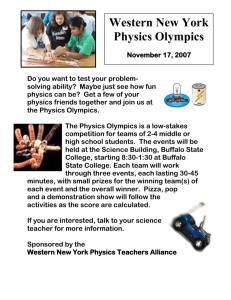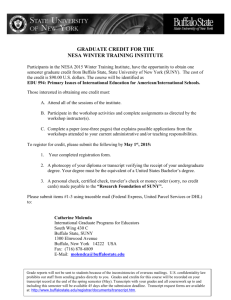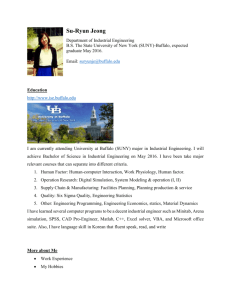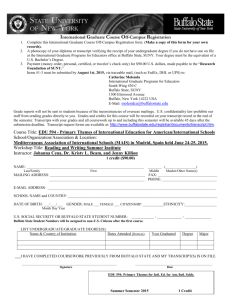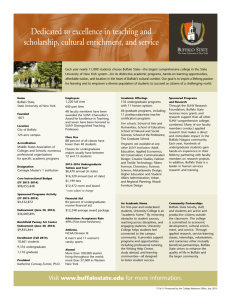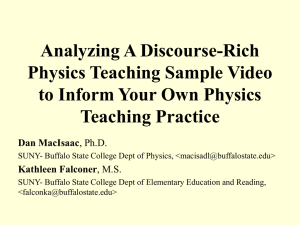WNYPTA 20 Years, Final - Physics
advertisement
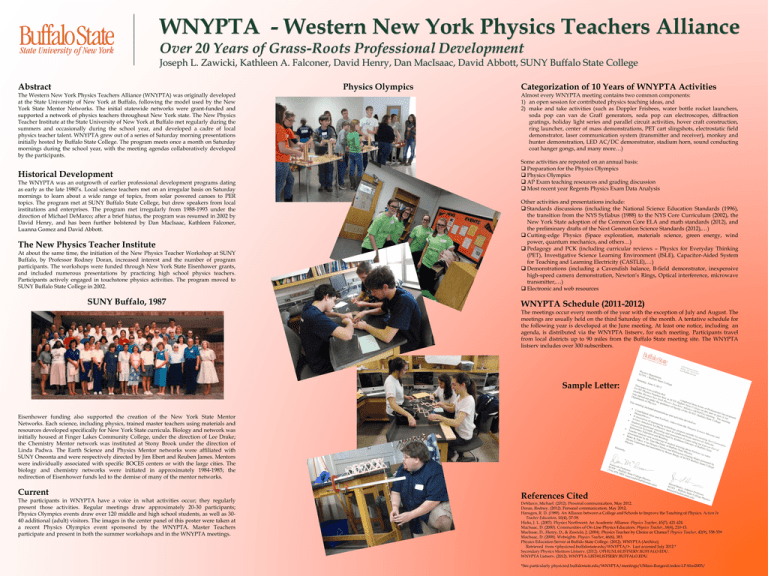
WNYPTA - Western New York Physics Teachers Alliance Over 20 Years of Grass-Roots Professional Development Joseph L. Zawicki, Kathleen A. Falconer, David Henry, Dan MacIsaac, David Abbott, SUNY Buffalo State College Abstract Physics Olympics The Western New York Physics Teachers Alliance (WNYPTA) was originally developed at the State University of New York at Buffalo, following the model used by the New York State Mentor Networks. The initial statewide networks were grant-funded and supported a network of physics teachers throughout New York state. The New Physics Teacher Institute at the State University of New York at Buffalo met regularly during the summers and occasionally during the school year, and developed a cadre of local physics teacher talent. WNYPTA grew out of a series of Saturday morning presentations initially hosted by Buffalo State College. The program meets once a month on Saturday mornings during the school year, with the meeting agendas collaboratively developed by the participants. Historical Development The WNYPTA was an outgrowth of earlier professional development programs dating as early as the late 1980’s. Local science teachers met on an irregular basis on Saturday mornings to learn about a wide range of topics, from solar powered canoes to PER topics. The program met at SUNY Buffalo State College, but drew speakers from local institutions and enterprises. The program met irregularly from 1988-1993 under the direction of Michael DeMarco; after a brief hiatus, the program was resumed in 2002 by David Henry, and has been further bolstered by Dan MacIsaac, Kathleen Falconer, Luanna Gomez and David Abbott. The New Physics Teacher Institute At about the same time, the initiation of the New Physics Teacher Workshop at SUNY Buffalo, by Professor Rodney Doran, increased interest and the number of program participants. The workshops were funded through New York State Eisenhower grants, and included numerous presentations by practicing high school physics teachers. Participants actively engaged in touchstone physics activities. The program moved to SUNY Buffalo State College in 2002. SUNY Buffalo, 1987 Categorization of 10 Years of WNYPTA Activities Almost every WNYPTA meeting contains two common components: 1) an open session for contributed physics teaching ideas, and 2) make and take activities (such as Doppler Frisbees, water bottle rocket launchers, soda pop can van de Graff generators, soda pop can electroscopes, diffraction gratings, holiday light series and parallel circuit activities, hover craft construction, ring launcher, center of mass demonstrations, PET cart slingshots, electrostatic field demonstrator, laser communication system (transmitter and receiver), monkey and hunter demonstration, LED AC/DC demonstrator, stadium horn, sound conducting coat hanger gongs, and many more…) Some activities are repeated on an annual basis: Preparation for the Physics Olympics Physics Olympics AP Exam teaching resources and grading discussion Most recent year Regents Physics Exam Data Analysis Other activities and presentations include: Standards discussions (including the National Science Education Standards (1996), the transition from the NYS Syllabus (1988) to the NYS Core Curriculum (2002), the New York State adoption of the Common Core ELA and math standards (2012), and the preliminary drafts of the Next Generation Science Standards (2012),…) Cutting-edge Physics (Space exploration, materials science, green energy, wind power, quantum mechanics, and others…) Pedagogy and PCK (including curricular reviews – Physics for Everyday Thinking (PET), Investigative Science Learning Environment (ISLE), Capacitor-Aided System for Teaching and Learning Electricity (CASTLE),…) Demonstrations (including a Cavendish balance, B-field demonstrator, inexpensive high-speed camera demonstration, Newton’s Rings, Optical interference, microwave transmitter,…) Electronic and web resources WNYPTA Schedule (2011-2012) The meetings occur every month of the year with the exception of July and August. The meetings are usually held on the third Saturday of the month. A tentative schedule for the following year is developed at the June meeting. At least one notice, including an agenda, is distributed via the WNYPTA listserv, for each meeting. Participants travel from local districts up to 90 miles from the Buffalo State meeting site. The WNYPTA listserv includes over 300 subscribers. Sample Letter: Eisenhower funding also supported the creation of the New York State Mentor Networks. Each science, including physics, trained master teachers using materials and resources developed specifically for New York State curricula. Biology and network was initially housed at Finger Lakes Community College, under the direction of Lee Drake; the Chemistry Mentor network was instituted at Stony Brook under the direction of Linda Padwa. The Earth Science and Physics Mentor networks were affiliated with SUNY Oneonta and were respectively directed by Jim Ebert and Reuben James. Mentors were individually associated with specific BOCES centers or with the large cities. The biology and chemistry networks were initiated in approximately 1984-1985; the redirection of Eisenhower funds led to the demise of many of the mentor networks. Current The participants in WNYPTA have a voice in what activities occur; they regularly present those activities. Regular meetings draw approximately 20-30 participants; Physics Olympics events draw over 120 middle and high school students, as well as 3040 additional (adult) visitors. The images in the center panel of this poster were taken at a recent Physics Olympics event sponsored by the WNYPTA. Master Teachers participate and present in both the summer workshops and in the WNYPTA meetings. References Cited DeMarco, Michael. (2012). Personal communication, May 2012. Doran, Rodney. (2012). Personal communication, May 2012. Hansgen, R. D. (1989). An Alliance between a College and Schools to Improve the Teaching of Physics. Action In Teacher Education, 10(4), 57-58. Hicks, J. L. (2007). Physics Northwest: An Academic Alliance. Physics Teacher, 45(7), 421-424. MacIsaac, D. (2000). Communities of On-Line Physics Educators. Physics Teacher, 38(4), 210-13. MacIsaac, D., Henry, D., & Zawicki, J. (2004). Physics Teacher by Choice or Chance? Physics Teacher, 42(9), 558-559. MacIsaac, D. (2008). Websights. Physics Teacher, 46(6), 383. Physics Education Server at Buffalo State College. (2012). WNYPTA (Archive). Retrieved from <physicsed.buffalostate.edu/WNYPTA/>. Last accessed July 2012.* Secondary Physics Mentors Listserv. (2012). OPHUNL@LISTSERV.BUFFALO.EDU. WNYPTA Listserv. (2012). WNYPTA-LIST@LISTSERV.BUFFALO.EDU. *See particularly physicsed.buffalostate.edu/WNYPTA/meetings/UMass-RutgersLinden-LPAlist2005/

